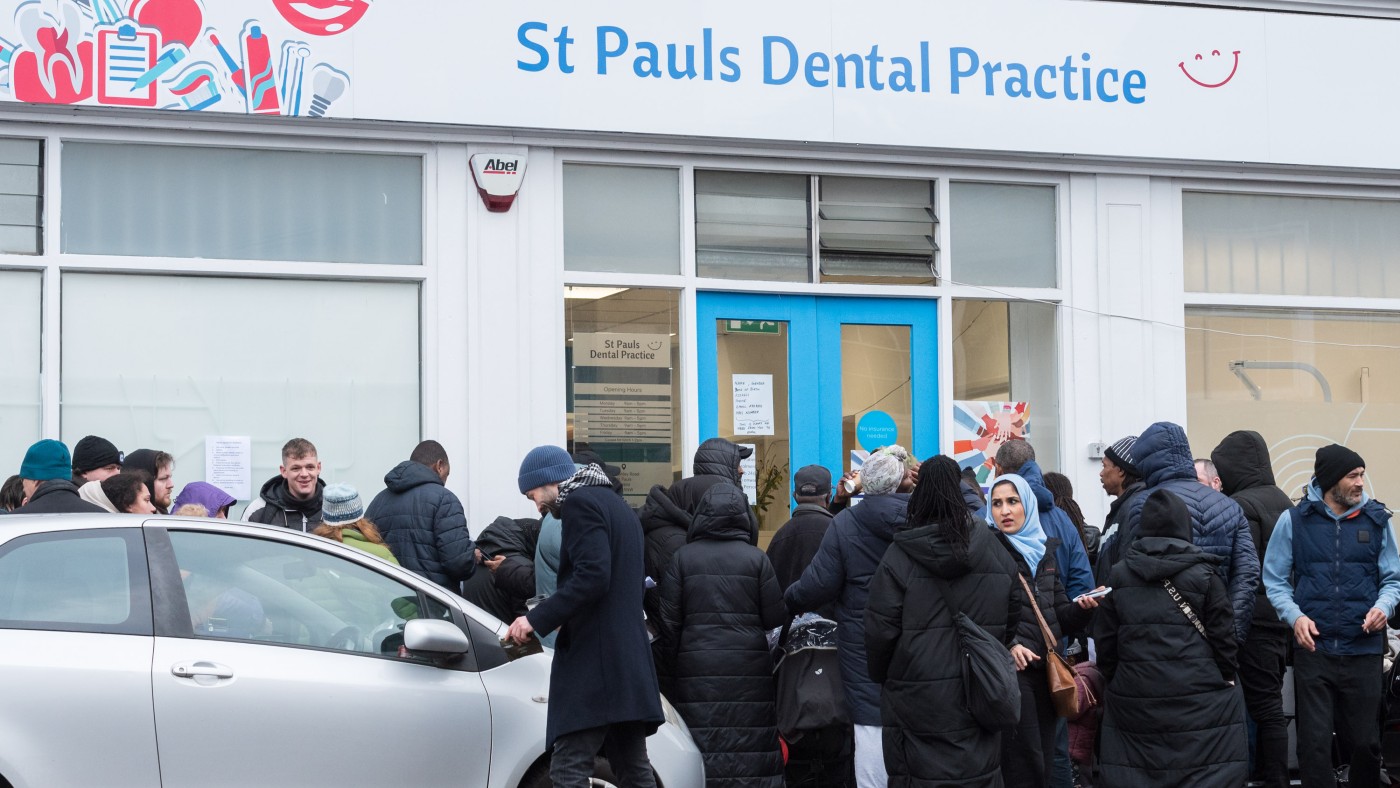Why Labour is struggling to fix dental crisis
'Desperate' patients see no sign yet of government promises to improve NHS dentistry

A free daily email with the biggest news stories of the day – and the best features from TheWeek.com
You are now subscribed
Your newsletter sign-up was successful
"NHS dentistry is at death's door," the UK health secretary said at the start of the year.
Wes Streeting has pledged to improve people's access to dentists – but the scale of the crisis he's facing came into focus last week when hundreds of people queued for hours in the cold to register as patients at an NHS dental surgery in Bristol, echoing similarly chaotic scenes last year. Carla Denyer, Green Party co-leader and MP for Bristol Central, said the "astonishing scenes" were a "testament to how broken NHS dentistry is".
Stories abound of people being forced into "DIY dentistry" – pulling out their own teeth in desperation when they cannot get an appointment – but dental experts have pointed out that the government's much-trumpeted Plan For Change does not include any targets or timelines for dentistry.
The Week
Escape your echo chamber. Get the facts behind the news, plus analysis from multiple perspectives.

Sign up for The Week's Free Newsletters
From our morning news briefing to a weekly Good News Newsletter, get the best of The Week delivered directly to your inbox.
From our morning news briefing to a weekly Good News Newsletter, get the best of The Week delivered directly to your inbox.
How bad is Britain's dental crisis?
Nearly 97% of adults who didn't already have a dentist weren't able to access NHS dental care last year, according to the Office for National Statistics. "This is a reminder that, for new patients, NHS dentistry has effectively ceased to exist," said British Dental Association chair Eddie Crouch.
And extraction of decayed teeth is the most common reason children are admitted to hospital. Almost a quarter of five-year-olds suffer from painful tooth decay, according to the Daily Mirror. Access difficulties disproportionately affect those in deprived areas. In the poorest parts of England, almost two-thirds of children have rotten teeth, official data revealed last week. In October, ministers warned the scale of the problem was "truly Dickensian".
The Conservatives published an ambitious dental recovery plan last February – but, in November, the government's spending watchdog warned that it was failing.
What's to blame?
The Nuffield Trust thinktank warned in a 2023 report that NHS dental services were in "near-terminal decline" because of the increasing difficulty in accessing a dentist, exacerbated by the closure of routine dentistry for several weeks during the Covid-19 pandemic, a "funding squeeze", and "growing inequalities in oral health". These problems have "deep roots in a series of poor policy choices", the report said.
A free daily email with the biggest news stories of the day – and the best features from TheWeek.com
Successive governments have been criticised for slashing spending on NHS dentistry, which the BDA claims has dropped by £1 billion in real terms since 2010.
There is also "widespread consensus" that the contract between government and NHS dentists is "unfit for purpose", said The Guardian. Dentists are paid for each "unit of dental activity", a capped system that means they are "paid the same whether they deliver three fillings or 20". So, treating a patient with a lot of dental problems can end up incurring the dentist a financial loss. Dentists are effectively being penalised for treating NHS patients, say critics.
What are possible solutions?
Currently, dental practices can – and do – remove "inactive" patients from their register. So the government should base its plan for dentistry on "the principle of giving people the right to register permanently with a dental practice, as they do with an NHS GP", said Louise Ansari, the chief executive of NHS patient watchdog Healthwatch England. "This will help them access ongoing appointments and check-ups, and ensure continuity of care from a trusted professional," she told The Guardian.
Dentists currently advise check-ups every six months but that may be unnecessary, according to Mark Dayan, a policy analyst at the Nuffield Trust. A review of evidence by the National Institute for Care and Health Excellence found that a gap as long as two years is perfectly safe for many adults, he told the paper, which would "free up dentists' time".
What is Labour doing?
Labour has inherited a situation where "desperate" dental patients are "forced to queue around the block", a Department of Health and Social Care spokesperson told the BBC.
The government has promised to provide an extra 700,000 urgent dentistry appointments, and "reform the dental contract to encourage more dentists to offer NHS services" – although negotiations have yet to begin. "We are rebuilding NHS dentistry but it will take time," the spokesperson said.
But the BDA said there has been "no progress towards delivery" since Labour won power last year. The "clock is ticking", Crouch told Dentistry. "If reform is kicked into the long grass, there won't be a service left to save."
Harriet Marsden is a senior staff writer and podcast panellist for The Week, covering world news and writing the weekly Global Digest newsletter. Before joining the site in 2023, she was a freelance journalist for seven years, working for The Guardian, The Times and The Independent among others, and regularly appearing on radio shows. In 2021, she was awarded the “journalist-at-large” fellowship by the Local Trust charity, and spent a year travelling independently to some of England’s most deprived areas to write about community activism. She has a master’s in international journalism from City University, and has also worked in Bolivia, Colombia and Spain.
-
 How the FCC’s ‘equal time’ rule works
How the FCC’s ‘equal time’ rule worksIn the Spotlight The law is at the heart of the Colbert-CBS conflict
-
 What is the endgame in the DHS shutdown?
What is the endgame in the DHS shutdown?Today’s Big Question Democrats want to rein in ICE’s immigration crackdown
-
 ‘Poor time management isn’t just an inconvenience’
‘Poor time management isn’t just an inconvenience’Instant Opinion Opinion, comment and editorials of the day
-
 ‘Zero trimester’ influencers believe a healthy pregnancy is a choice
‘Zero trimester’ influencers believe a healthy pregnancy is a choiceThe Explainer Is prepping during the preconception period the answer for hopeful couples?
-
 A real head scratcher: how scabies returned to the UK
A real head scratcher: how scabies returned to the UKThe Explainer The ‘Victorian-era’ condition is on the rise in the UK, and experts aren’t sure why
-
 How dangerous is the ‘K’ strain super-flu?
How dangerous is the ‘K’ strain super-flu?The Explainer Surge in cases of new variant H3N2 flu in UK and around the world
-
 Stopping GLP-1s raises complicated questions for pregnancy
Stopping GLP-1s raises complicated questions for pregnancyThe Explainer Stopping the medication could be risky during pregnancy, but there is more to the story to be uncovered
-
 RFK Jr. sets his sights on linking antidepressants to mass violence
RFK Jr. sets his sights on linking antidepressants to mass violenceThe Explainer The health secretary’s crusade to Make America Healthy Again has vital mental health medications on the agenda
-
 Nitazene is quietly increasing opioid deaths
Nitazene is quietly increasing opioid deathsThe explainer The drug is usually consumed accidentally
-
 The plant-based portfolio diet invests in your heart’s health
The plant-based portfolio diet invests in your heart’s healthThe Explainer Its guidelines are flexible and vegan-friendly
-
 More women are using more testosterone despite limited research
More women are using more testosterone despite limited researchThe explainer There is no FDA-approved testosterone product for women